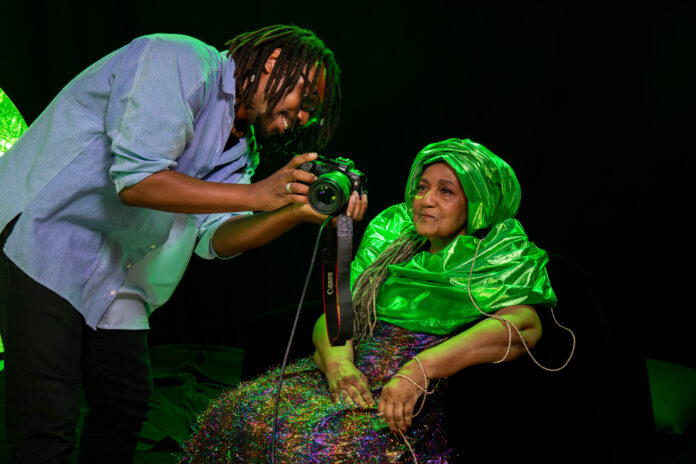
Philly is home to a wealth of artists, musicians, producers, filmmakers, performers and business owners, many of whom are part of the LGBTQ+ community. Now, these creators have a welcoming, state-of-the-art production studio in GroundFloor Studios, which opened on Oct. 23 at 13th and Walnut in Philadelphia.
GroundFloor Studios is a partnership between ChatterBlast Media, a queer-owned communications company that offers strategy, creative content, digital advertising and more, and Big Picture Alliance (BPA), whose mission is to “empower Philadelphia youth to define their own narrative through filmmaking and digital media arts,” according to the organization’s website.
“While I never have felt uncomfortable or threatened in other spaces, I think it’s important to have a space that creatives can come to and know that they won’t feel othered, that their work will be respected, understood, appreciated and amplified,” said Matthew Ray, who co-owns GroundFloor with Evan Urbania and serves as chief creative officer for ChatterBlast.
So far, the team at GroundFloor has already accommodated a variety of photoshoots for retail organizations, clothing brands and local fitness brands; a queer creator is working on a podcast in the space; a gay singer used the studio to record a few songs in video and audio format; several drag performers have utilized the space for video work, and a local queer business owner had a photoshoot session of their products and merchandise with the help of models.
GroundFloor has in-house equipment and staff, so creatives can utilize the space if they have none of their own equipment or technicians, or if they have everything they need. BPA has a partnership with SONY, which has supported the organization’s workforce development programs. As such, GroundFloor has some of the best equipment in Philadelphia, Ray said.
“If all you have is a vision and a creative idea, you can come to GroundFloor Studios and we’ll help facilitate that, whether that’s through a partnership with BPA or a partnership with ChatterBlast,” Ray said. “Or we just open the doors for you and you rent the space, you bring in your own equipment, you bring in your own model, or [if] you’re someplace in between.”
The studio has a cyclorama, or a cyc wall, which creates the illusion of a sky. It also has multiple green screens, LED lights that run on a Sidus link iPad app for professional-level lighting control, and can hold 30-35 people for the purpose of screening films.
Even though ChatterBlast has been providing creative solutions for 15 years and has gotten a lot of support from businesses, the city of Philadelphia and allies, “there are still times when queer people have specific media they need to build; we have specific messages,” Ray said. “Now more than ever, when our voices are being marginalized in communities close to us — in Bucks County, on these school boards, it’s just important to have a space so that we can create, so that we can build representation, so that we can tell our stories, and so that we can find like-minded people who share in our experiences or want to know our experiences, and we can get [them] out there.”
BPA provides training and workforce development and ChatterBlast has teachers and mentors, so the goal is to incorporate training and mentoring into the services that GroundFloor has to offer down the line.
“In our position as marketers and advertisers, especially in the world of social media and digital, there is going to continue to be a need for jobs in video production, videography, photography [and] documentary work,” Ray said. “We’ve seen how BPA can really train and empower people to tell those stories. Those are the people that we need. This is kind of a new avenue for both organizations to do that.”
Archival work is also in store for GroundFloor Studios, potentially with the help of grant funding partners. The archives would manifest in the form of interviews with LGBTQ+ community members, leaders and activists.
The GroundFloor team hopes to keep the archives accessible to “queer communities in the future so that they can understand what Philadelphia was like in the aughts or the ’90s or the ’80s,” Ray said.
Digitizing drag queen story hours is something else Ray would like to provide through GroundFloor, so the material is available for people in states that have restrictions on LGBTQ+ education and expression.
In the meantime, Ray would like to fill GroundFloor’s space with “all the queer creators we possibly can,” he said. In the last few decades, queer people have utilized digital spaces to connect with one another, Ray pointed out, referring to online dating sites and platforms like AOL Instant Messenger.
“Whether it’s sharing memes or talking to one another across huge distances through Instagram, the digital space has always been something that all of us in the queer community have been on the forefront of. Any way that we can help provide resources and opportunities for queer creators and straight ally creators, then we want to do that.”